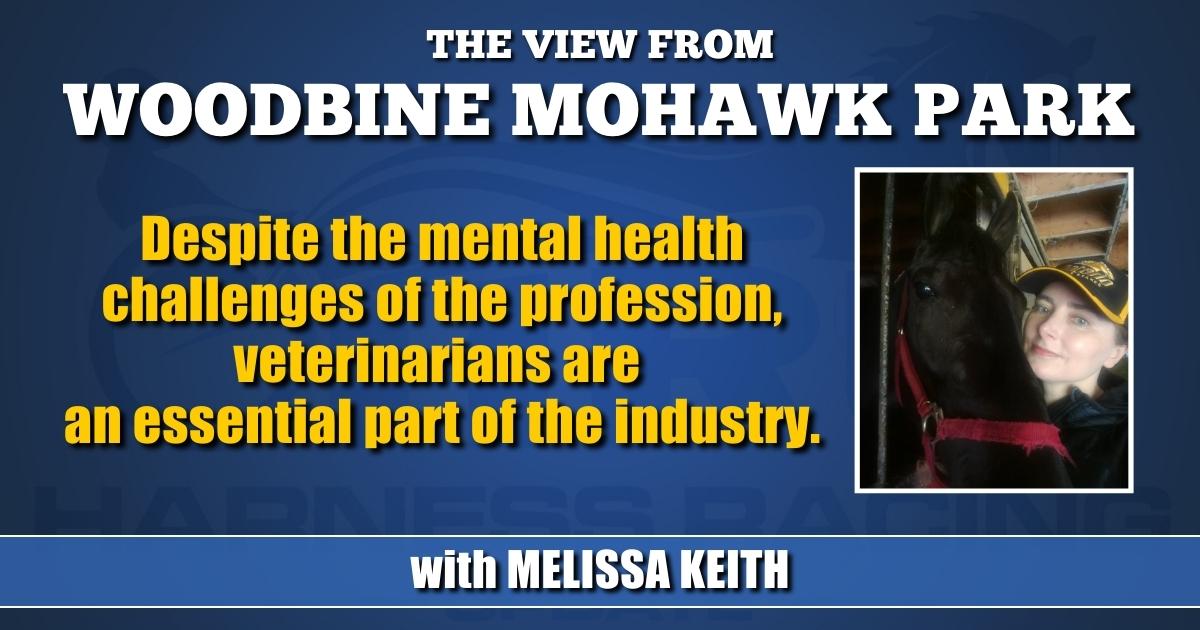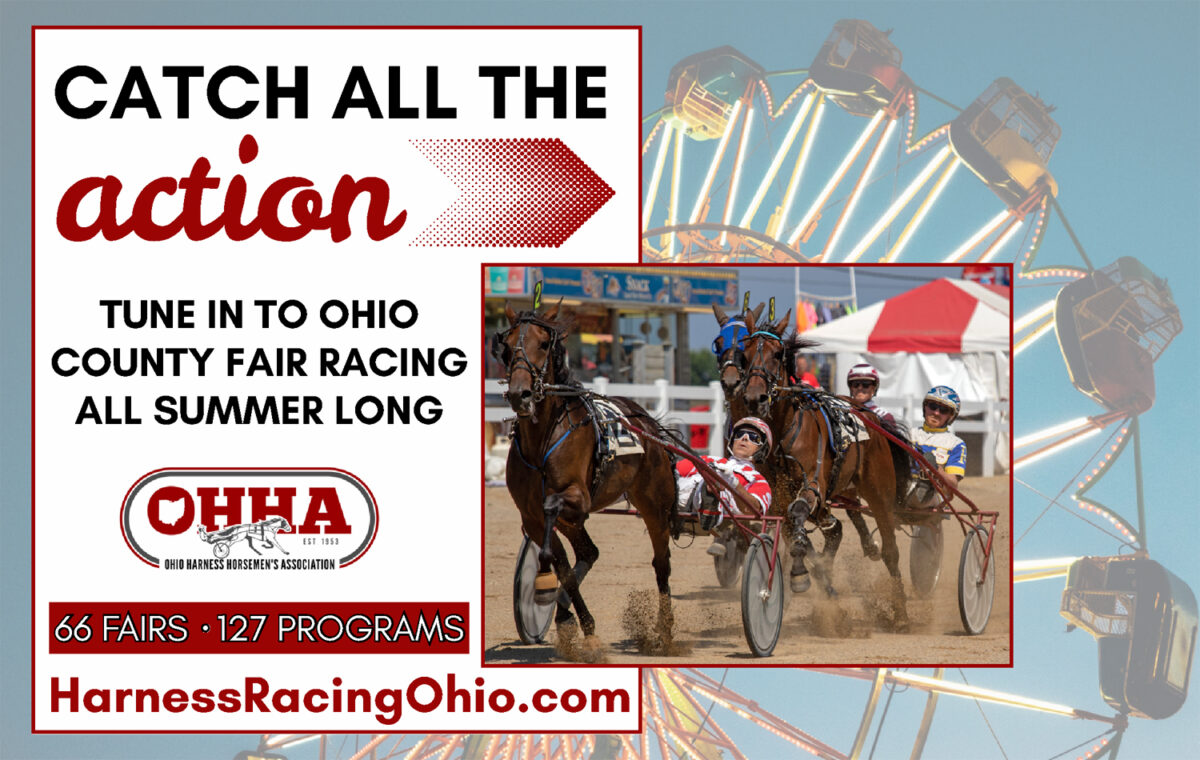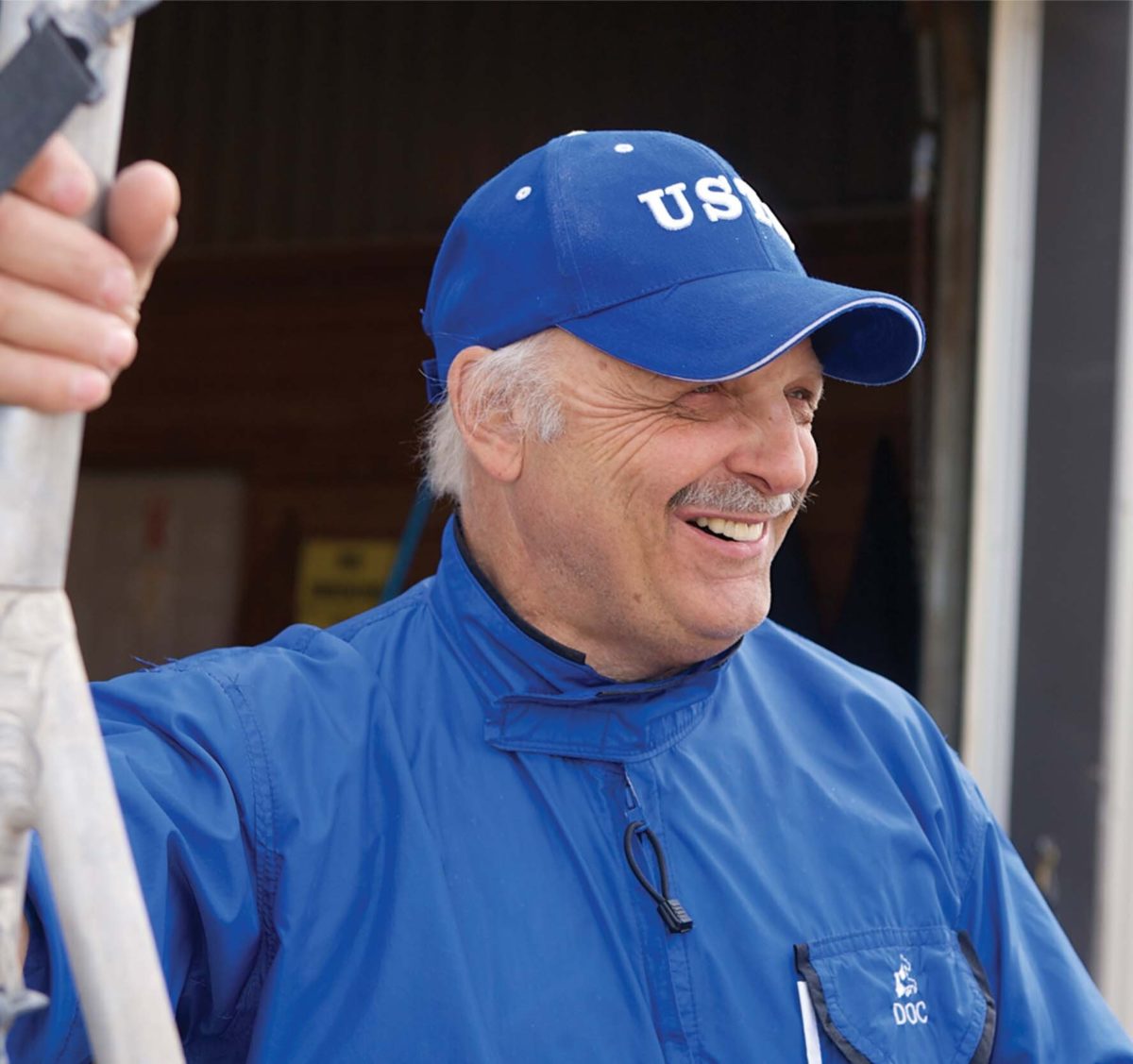Making a difference
Despite the mental health challenges of the profession, veterinarians are an essential part of the industry.
by Melissa Keith
In February through July of 2017, researchers at the University of Guelph in Ontario surveyed all of Canada’s veterinarians, working in every field. The theme of the study was mental health among veterinary practitioners; around 1,400 vets responded to researchers’ questions. In 2020, lead author Jennifer Perret, herself a veterinarian, told the University of Guelph News that between 27-30 per cent of respondents reported concerns such as depression, anxiety and burnout, a rate much higher than the general Canadian population.
Suicidal thoughts and actions are not uncommon in the veterinarian profession. Last July, a 36-year-old equine vet took her own life. Dr. Andrea Kelly owned the Ottawa Valley Large Animal Clinic and was licensed to practice in Ontario and Quebec. She was remembered in the Rideau Carleton Raceway winner’s circle on Aug. 14, when pacer Erikas Shadow won the race held in the late veterinarian’s honor: Track announcer John MacMillan described Kelly as “a very kind, caring, compassionate and talented veterinarian… loved by all of her clients and respected by her peers.”
Her family recommended donations be made to Not One More Vet, an organization founded by Dr. Nicole McArthur in 2014 after the suicide of Dr. Sophia Yin, another vet. It began as a private Facebook group for veterinarians to share their struggles and has grown to encompass outreach, education, and support programs.
Equine veterinary medicine is a challenging career path, particularly when it involves racehorses – animals variously considered livestock, athletes, and/or pets by their owners.
Dr. Adam Chambers is senior manager of veterinary services for the Alcohol and Gaming Commission of Ontario (AGCO), which regulates horse racing.
“Veterinarians may choose to become racetrack veterinarians because of their love of the horses, desire to help animals, and passion for the racing industry,” he told HRU. “The health, safety and welfare of all racing participants – human and equine – are of utmost importance to the Alcohol and Gaming Commission of Ontario.”
Chambers outlined different types of racehorse vets working in Ontario.
“AGCO veterinarians are employed by the AGCO; official veterinarians work for the racetracks and are supervised by the AGCO; veterinarians hired by owners and trainers must be licensed by the AGCO. All have specific knowledge of racehorses, have completed years of specialized study and are licensed by both the College of Veterinarians of Ontario (CVO) and the AGCO.”
These professionals share similarities: “By nature, the work of all veterinarians can be challenging – evaluating horses and ensuring that they are fit to race. If they are not, the need to scratch horses, then deal with sometimes acute injuries.”
Their work is essential to racetracks, including Woodbine Mohawk Park.
“There are always one (or more) official veterinarians on duty during Woodbine Mohawk Park qualifiers and races. AGCO veterinarians can also be in attendance,” said Chambers. “During a standardbred race card event, official veterinarians observe horses on the track, examine horses of interest, provide emergency care for acute injuries, and record and relay their findings to the AGCO judges.”
Dr. Ian Moore has never worked as an AGCO vet or official racetrack vet, but he’s an AGCO-licensed equine veterinarian with decades of experience.
“I still do a bit,” he said, recently speaking from Key West, FL. “I don’t work as a veterinarian down here in the wintertime. I have a Florida license, but I just have it to make sure I’m okay with my own horses, and if there are any emergencies around the [Southern Oaks] Training Centre when the regular guys aren’t there, I look after it.”
With 20 horses under his care as trainer, Moore said he finds himself increasingly focused on that aspect of his career.
“In the summertime, I have been doing veterinary work in the afternoons, after the barn. I’m not sure I’ll continue that this year. I turned 69 last week, so I don’t know if I will or not.
“I haven’t done as much in recent years as I used to, but up until a couple of years ago, I was still working full-time at it and made some long days. That’s why I’ve trimmed down a little bit in the last couple of years. You know, I’ve done it for 41 years now – 40 as an equine veterinarian; the first year I did a mixed practice on PEI, and I’ve enjoyed every minute of it.”
Moore said he’s aware of the internal struggles faced by many in his first profession, although he has personally not experienced much, if any, downside.
“It’s very rewarding and I got to meet a lot of nice people, a lot of the top trainers, and got to work on a lot of top horses along the way,” Moore said. “That’s what’s made it so special and so rewarding for me, and so difficult for me to give it up totally, because I still enjoy doing it. I hate to give it up.”
When not in Florida or traveling with horses, Moore is based at Shamrock Training Centre in Cambridge, ON.
“My whole life, I’ve always had a few horses. Earlier on, I was a career veterinarian I guess, so I might have had two, three, four horses, something like that. It changed for me, probably around 2004-2005, when I had Astronomical and started trending more towards the other way.”
He told HRU that he finds satisfaction in connections with colleagues throughout the standardbred industry.
“I still enjoy doing [vet work] and I did last summer. Especially in the last couple of years, I’d do work for [trainers] Teesha Symes and Mitchell Tierney, people who worked for me, young people who are going with their own stables now, so that’s always nice as well.”
Moore was an instructor at the Atlantic Veterinary College in Charlottetown, PEI for 13 years, and to this day maintains friendly relationships with former students, many of whom practice in racing contexts across the USA and Canada.
“One of the most highly-regarded equine veterinarians in New Jersey spent a lot of time with me, and another in Indiana, and so on,” Moore said. “That’s always good. Anytime we send [horses] anywhere, I can always text them or call them and ask them what the drug withdrawal times are. That’s one of the things I find really difficult: Every state and every province has different rules. There’s no uniform set of rules…. so that’s why you need to have a friend like that to talk to. These guys do call or text me every once in a while for advice, and I enjoy that.
“It’s valuable on my end too, because if I’m working with a case or situation, it’s always good to have another opinion. Those are people I trust, and there’s a wide network of them out there across North America. I can pick up the phone anytime and they’ll answer it right away. That’s always good for the horses and clients I’m working with.”
Moore said he’s aware of the mental health challenges faced by some peers.
“That’s not uncommon in vet medicine. In fact, in my class of 120, there’s at least two I’m aware of who committed suicide over the years,” he said.
He likened the pressures faced by equine vets to the pressures faced by a CEO in charge of a company: an inherent part of the path, requiring proper management.
“Over the years, I’ve learned to combine my lifestyle with my career with veterinary medicine and I’ve been able to keep it all together, in one place.
“I think that like anything else, a person’s attitude toward the job that they’re doing is going to play a big role in how you live your lifestyle. So for me, the first half of my equine veterinary career, I was totally dedicated to it and [avoiding] conflict of interest was always on my mind… People got to trust me, especially down in the Maritimes. They would come first, ahead of anything else I ever did.”
Later, he also found that maintaining balance is essential, as a vet and as a trainer.
“Absolutely it is. The things that you just mentioned [i.e. not taking it personally when a client is angry or an animal doesn’t recover], those are things that I learned in the first three months out of school, in a real hurry. I think for new graduates who don’t learn that, they’re the ones who are going to struggle.”
Finding balance wasn’t automatic.
“When I got out of school, probably much like the other 119 people in my class, I thought, ‘I’m going to be the top veterinarian in North America – I’m going to fix everything and cure everybody with these new technologies.’ This was in 1982. After about three months, my version of that changed dramatically, where it became very apparent that you’re never going to please everybody when you’re dealing with the public – absolutely not. All you can do is do your job in an honest and ethical and proper manner. If you treat everybody fairly and squarely, treat everybody the same, that’s all that can be asked of you, at the end of the day.
“You’ll never be faulted for that. Lawsuits and things, when they go to court, as long as you’ve done all of the above, and according to the standards of the day, no judge anywhere in North America is going to find a veterinarian liable. The cases where they find liability are gross negligence, with things done wrong and not according to the standards of the day. Or they did unethical things, like some of these guys like Nick Surick that I’m reading about today.”
Dr. Adam Chambers said that any vet can be susceptible to mental health issues.
“We are familiar with that [University of Guelph] study you mentioned and recognize that AGCO veterinarians, official veterinarians at the tracks, and veterinarians hired by owners and trainers are not immune to these types of pressure and stress.”
He added that AGCO veterinarians are employees with, “access to support systems for well-being,” while the 18 official veterinarians across the province are employed by racetracks where “these veterinarians may have access to their employer’s supports.”
The AGCO also keeps in regular contact with these practitioners, who must sometimes pass along unwelcome news to owners and trainers.
“They frequently give advice and make decisions on what is in the best interest of the horse,” said Chambers. “Racing participants can listen to what their veterinarian is advising and understand that this advice is being provided in the horse’s best interest – not for financial or personal gains or to make an owner feel pressured.
“The most powerful thing a racing participant can do is every once in a while, simply say, ‘Thank you, you are making a difference.’”


















